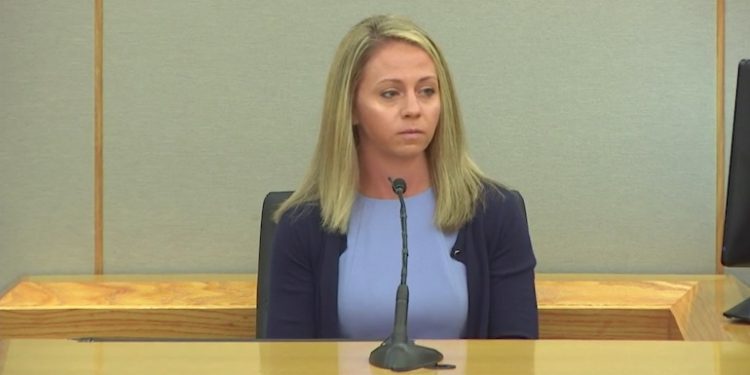A second appeal made on behalf of Amber Guyger, the former Dallas police officer that was convicted of killing Botham Jean in his home, has been denied yet again by the Texas 5th Court of Appeals. The first appeal of her conviction was made and rejected this past August.
According to Fox 4 News, Guyger’s attorneys sought to undo a 10-year prison sentence for the 2018 fatal shooting of the 26-year-old accountant. Jean was innocently sitting in his fourth-floor apartment, eating a bowl of ice cream, when the then-officer came into his home, and shot him dead.
Testimony revealed that she lived directly below his, and she thought she was entering into her own domicile, believing a stranger had broken in, when she shot him.
Guyger and her team contend that her use of deadly force was reasonable, using that strategy to appeal for a rehearing. The Court of Appeals denied their petition.
Three judges, Chief Justice Robert D. Burns III, and Justices Lana Myers and Robbie Partida-Kipness disagreed and laid out their reasoning in a 23-page ruling. In addition to their collective siding with the earlier courts on the 33-year-old’s use of deadly force, they also rejected the notion that evidence supported her being convicted of criminally negligent homicide rather than murder.
Amber Guyger’s trial made headlines for a number of reasons, creating a deep divide in Dallas along color lines. Three days after the shooting on Sept. 6, she was arrested on a manslaughter charge. During one week of hearing evidence from that night, a grand jury rendered a murder indictment. This later led to her conviction that November.
During the 33-minute Zoom hearing with the justices in April, Chief Justice Robert D. Burns III said to Guyger’s lawyer, Michael Mowla, “You’re overlooking the fact that Ms. Guyger testified she intended to shoot Mr. Jean.”
Her team pushed back but was met by a rebuttal from Justice Lana Myers, “There has to be evidence negating the intent to kill.”
Myers even swiped at Mowla saying, “Mr. Mowla, aren’t you erroneously mixing ‘mistake of fact’ defense and self-defense justification?”
In the Nov. 17 ruling, the three justices noted, “Guyger testified she intended to kill Jean when she shot him. In addition, the State introduced evidence that Jean was a living human being — an individual — whose death was caused by the gunshot wound inflicted by Guyger. Accordingly, legally sufficient evidence supports the jury’s murder verdict.”
Her grounds for the appeal strongly leaned on a self-defense plea. The ruling also shared why the defense is mistaken — and Guyger should remain behind bars— by citing various other cases that set the precedent.
The justices wrote on page 9, “If the evidence raises the defense, ‘whether that evidence is weak or strong, unimpeached or contradicted, and regardless of what the trial court may or may not think about the credibility of the evidence,’ the trial court should provide the instruction.
Granger, 3 S.W.3d at 38. Thus, in this case, mistake of fact would apply if Guyger mistakenly formed a reasonable belief that negated her intent to kill Jean. We differentiate mistake of fact—a defense—from justification. Justification provides a defense to prosecution when the conduct in question is justified under Chapter 9 of the Penal Code.”
Standing on this decision, Guyger will continue to serve the remaining seven years of her sentence and is eligible for parole in 2024.
Guyger’s conviction, coming in the fall before the 2020 summer of civil unrest, was hailed as perhaps a breakthrough by local African-American activists. Rev. Dr. Frederick Haynes of Friendship-West Baptist Church said to Fox 4 News after the verdict, “Although he [Jean] was murdered, I’m convinced that justice is experiencing a resurrection here in Dallas that’s long overdue.”
The pastor continued, “Unfortunately, it took the death of a perfect victim in circumstances that were quite obvious to most in order for justice to experience what appears to be a resurrection.”


